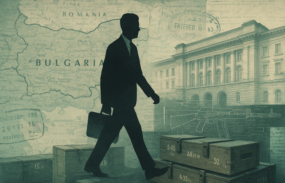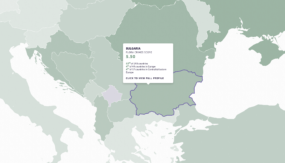Posted on 01 Oct 2025
In July 2025, US prosecutors in Virginia unsealed an indictment accusing Petar Dimitrov Mirchev, a Bulgarian national, of conspiring with East African associates to supply a powerful Mexican drug syndicate with weapons ranging from small arms to battle tanks. The intended recipient was the Jalisco New Generation Cartel (CJNG), designated as a terrorist organization by the US this year. According to prosecutors, Mirchev aimed to enable the group to cause ‘catastrophic suffering’ for financial gain.
But this is not a typical tale of weapons smuggled across borders in trucks or buried deep in shipping containers. Instead, it is a matter of paperwork. Mirchev’s network produced an end-user certificate naming the Tanzania People’s Defence Force as the supposed purchaser, backed up with a delivery verification document fraudulently signed in the name of a senior defence ministry official. By fabricating a credible buyer, Mirchev was able to present the deal as legitimate to suppliers and regulators.
The indictment revealed that Mirchev had compiled a sales proposal for the CJNG worth over €53.7 million, laying out an arsenal that would have given the cartel the upper hand in their battles with the police and rival gangs for years to come. In July 2024, Mirchev and his partners sent a test shipment from Bulgaria, including 50 AK-47 rifles and 140 000 rounds of ammunition. But the attempt was scuppered. Investigators were able to trace bank transfers tied to shipment, one of which involved almost US$38 000 being sent from a US bank account to a Bulgarian arms manufacturer with links to Mirchev. The weapons were seized, and Mirchev was arrested in Spain in April 2025.
Protected by proximity
Media coverage of the event in Bulgaria focused on the involvement of the notoriously ultra-violent CJNG cartel, with little attention paid to the source of the weapons. Although reports described Mirchev’s access to Bulgaria’s arms stockpiles and the network of contacts that enabled him to operate, the story passed without significant impact.
And Mirchev is hardly an unknown quantity. For decades, his name has appeared in dossiers and investigative reports. Remarkably, however, he has never encountered any significant obstacles to his activities. Although he was considered a ‘priority target’ by the US, in Bulgaria he was absent from scrutiny.
To understand this anomaly, it is important to recognize the unique nature of Bulgaria’s arms sector. Because of its economic and geopolitical value, the industry is considered inviolable. People like Mirchev are able to move through this space, hiding in plain sight, specifically due their connections to state-linked networks. They do not face the kind of scrutiny their reputations should attract, as this would risk exposing the blurred lines between private traffickers and official structures.
The making of a weapons pipeline
Since the collapse of communism, Bulgaria has repeatedly been implicated in controversies surrounding the sale and diversion of weapons. In the 1990s, its vast Cold War-era stockpiles, coupled with a poorly regulated defence industry, became a wellspring for conflicts in the former Yugoslavia and Africa. Kalashnikov rifles, rocket-propelled grenades and ammunition left Sofia under dubious contracts, often routed through Middle Eastern brokers, eventually surfacing in Bosnia, Kosovo, Sierra Leone and Angola. A 2005 report on the proliferation and misuse of small arms and light weapons noted that Bulgaria was among the most active Eastern European suppliers to embargoed destinations during this period.
In the first decade of the 2000s, Bulgarian nationals began appearing in investigations into the infamous Russian arms trafficker Viktor Bout, known as the ‘Merchant of Death’. Bout’s transport networks needed weapons, and Bulgarian suppliers reportedly helped provide them. Court documents and press accounts describe how Bulgarian dealers handled procurement and warehousing, while Bout organized the airlifts to war zones. Mirchev was reportedly Bout’s mentor in these endeavours, with their relationship dating back to 1995.
The 2010s brought new controversies. As the Arab Spring uprisings descended into war, Bulgarian arms exports to the US and Gulf states were repurposed by covert programmes to support Syrian rebels. Official deliveries of rifles, machine guns and ammunition signed off in Sofia quickly slid into the arsenals of violent extremist organizations. A 2016 organized crime report documented the presence of Bulgarian-made rifles and heavy machine guns in the hands of Islamic State and al-Qaeda affiliates, demonstrating how legal flows were diverted once they entered conflict zones.
Together, these episodes reveal a decades-long pattern: a country with deep industrial capacity in arms production, weak oversight and ready brokers repeatedly being drawn into some of the world’s most violent conflicts.
A lethal cocktail
The Mirchev case illustrates how large-scale arms trafficking depends upon exploiting a patchwork of vulnerabilities: Bulgaria’s murky arms industry provided the weapons, while political corruption in Tanzania facilitated access to false certificates.
Formally, Bulgaria emphasizes its cooperation with Washington on such matters. Officials point to their collaboration in investigating Mirchev and in other operations against traffickers as evidence of the country’s commitment to its roles as an EU and NATO member. But beyond these gestures, there is no real debate at home: no hearings, no inquiries, no pressure for accountability.
Addressing this situation is highly challenging, given the legal veneer. Without direct oversight and post-shipment checks, mandated documents can easily be manipulated. Bulgaria committed to such processes when it ratified the Arms Trade Treaty in 2013. However, it is also telling that it was a tip-off from informants, rather than international legal obligations, that brought Mirchev down.
Mirchev’s invulnerability stemmed from the protective environment of Bulgaria’s arms industry. The forged Tanzanian seal alone would not have been enough; its effectiveness lay in the system that gave Mirchev legitimacy and the freedom to exploit it. Unless this political shield is dismantled, the cycle of shadowy deals will continue, and every fraudulent certificate will remain a potential avenue for arming organized crime.



